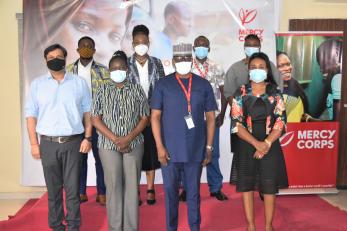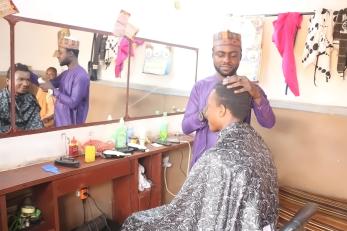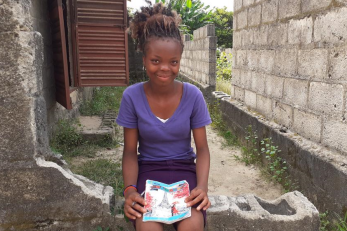5,000 youth empowered as Mercy Corps shares learnings from the ECOSAT project

Mercy Corps and its partners on Tuesday, January 26, 2021 held a virtual dissemination meeting in Abuja to mark the closeout of the Empowering Communities Through Strategic Actions for Transformation (ECOSAT) youth empowerment project. The project supported over 5,000 marginalized youth, between ages 17 to 30 years in Lagos, Kaduna, Kano States and the Federal Capital Territory of Nigeria, by improving their learning outcomes, access to economic assets and providing opportunities to live better lives.
Many youth face challenges like age and gender discrimination, limited access to financial services and lack market-relevant skills making them unemployable. These issues are further exacerbated by the shrinking economy, limited job opportunities and poor educational system. Without adequate personal and economic empowerment, they are left without a voice and no decision-making power to influence their future.
Speaking during the virtual meeting, Mercy Corps Nigeria Country Director, Ndubisi Anyanwu, said the project successfully engaged youth in internship/apprenticeship programs to acquire various income-earning skills.
“Drawing on our experiences delivering education and livelihood interventions in various contexts across the globe, Mercy Corps Nigeria through partnerships with the government, private sector, civil society organizations and youth groups across 26 communities co-designed tools and resources tailored to meet the beneficiaries’ needs, interests and contexts. These youths received trainings to build market-oriented, technical and work readiness skills that prepare them to enter the labor market; and leadership skills to influence decision-making,” he said.
In order to ensure the sustainability of the project, Mercy Corps partnered with the Agency of Mass Education (AME) across all implementing states. Then used the Agency’s placement tests to assess the literacy and numeracy skills of learners and cluster them into groups based on their learning ability. ECOSAT also utilized the AME’s community learning centers and trained AME Master Trainers as state level supervisors and mentors for the centers.
Mercy Corps, alongside four local partners, led the implementation at state levels; Bako Youth Development Foundation (BYDEF) in Kaduna State; Society for Women Development and Empowerment of Nigeria (SWODEN) in Kano; Tabitha Cumi Foundation in the Federal Capital Territory; and Women Advocates Research and Documentation Centre (WARDC) in Lagos State.
Aminu is one of the 5,000 marginalized youth ECOSAT has supported to return to school and gain vocational skills. Aminu (aged 24) has always wanted to further his education and explore his passion for barbing, but was unable to due to financial restraints and family commitments.

“ECOSAT has helped me become a business owner, I thought I will never be able to return to school but now I see myself going to school because I now have the money to pay for my SSCE and JAMB exams,” said Aminu.
Improving financial inclusion of marginalized youth being a core objective of the project, ECOSAT provided them with robust knowledge on managing their personal, family and business finances. Youth were then clustered into savings groups and cooperatives per community to instill a culture of savings in them, it also provided them the opportunity to leverage on one another’s financial resources and business experience.
“54% of youth interviewed at the endline of the project reported increased income and attributed this to the financial education and economic opportunities provided by the ECOSAT intervention project,” said Program Director of ECOSAT, Joy Aderele.
Most of the girls under the project were never able to attend school due to financial restraints and their cultural barriers. Out-of-school girls found the opportunity to learn basic numeracy and literacy skills most useful in their day-to-day lives. Bola Afolabi, aged 17, is one of these girls who prior to enrolling on the ECOSAT project, had difficulties in numeracy and struggled with her usage of present and past tenses in sentences as necessary. After 12 weeks into the ECOSAT project, Bola’s improvement was clear to everyone, including her mother.

“I am happy that ECOSAT has taught me how to give customers change and know how much to collect, because now I can support my mother very well at her shop,” said Bola.
“During today’s dissemination meeting, we were able to showcase the results of our youth engagement work and corroborate our learnings after 26 months of implementation with those of other organizations working on youth employability and entrepreneurship. As an organization, empowering youth is one of our core strategic objectives and we will continue to pursue this through relevant partnerships,” said ECOSAT Program Coordinator, Timothy Zakka.
Read more on the successes and impact of the ECOSAT program here
Mercy Corps appreciates the funding from the State of Oregon, the support of the Ministry of Education, Ministry of Women Affairs and their state level Ministries, Departments and Agencies (MDAs), the National Commission for Mass Literacy, Adult and Non Formal Education (NMEC) and Agency for Mass Education (AME) who provided funding and structures through which over 5,000 boys and girls improved their learning in literacy, numeracy, life skills and financial education. We hope that the meeting will be a catalyst in producing strong collaborations that will create substantial and sustainable impact in the lives of young people in Nigeria.
About ECOSAT
Mercy Corps led in the implementation of the Empowering Communities through Strategic Actions for Transformation (ECOSAT), a 26-month education project funded by the State of Oregon which complements the work of Educating Nigerian Girls in New Enterprises 2 (ENGINE II). ECOSAT provided learning and economic opportunities to over 5,000 out-of-school from marginalized communities in Federal Capital Territory (FCT), Lagos, Kano and Kaduna state in Nigeria.